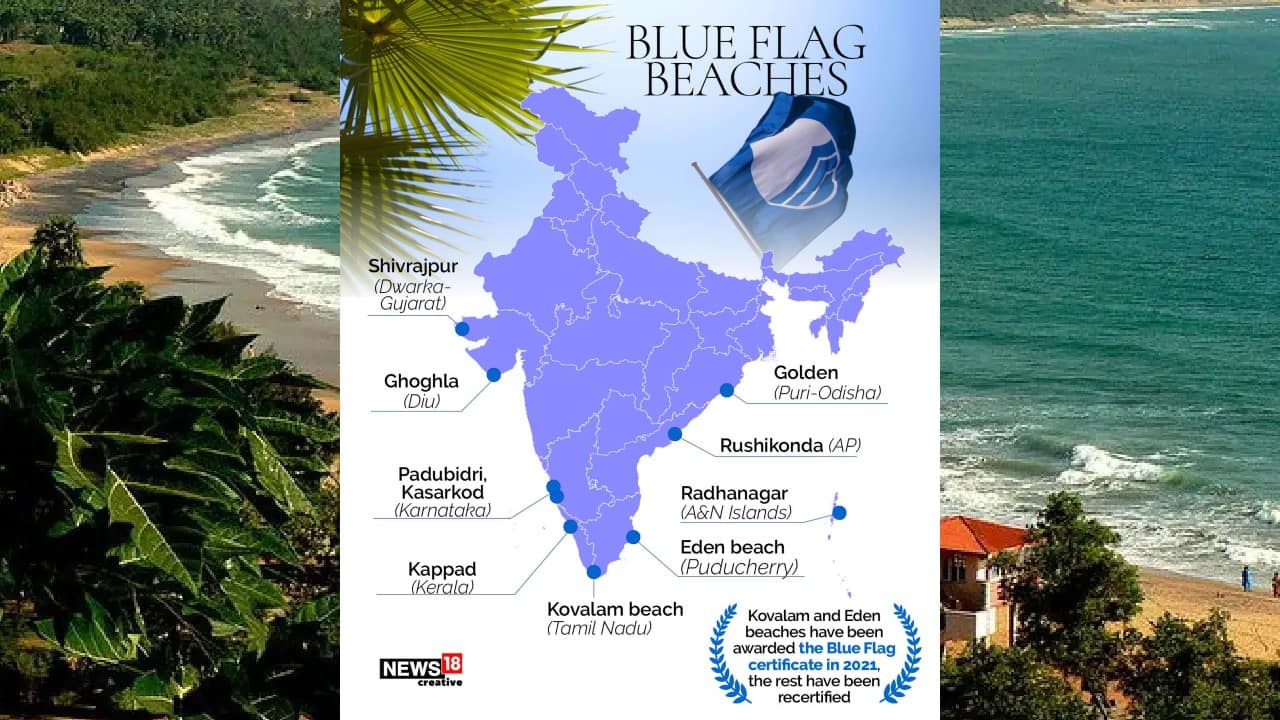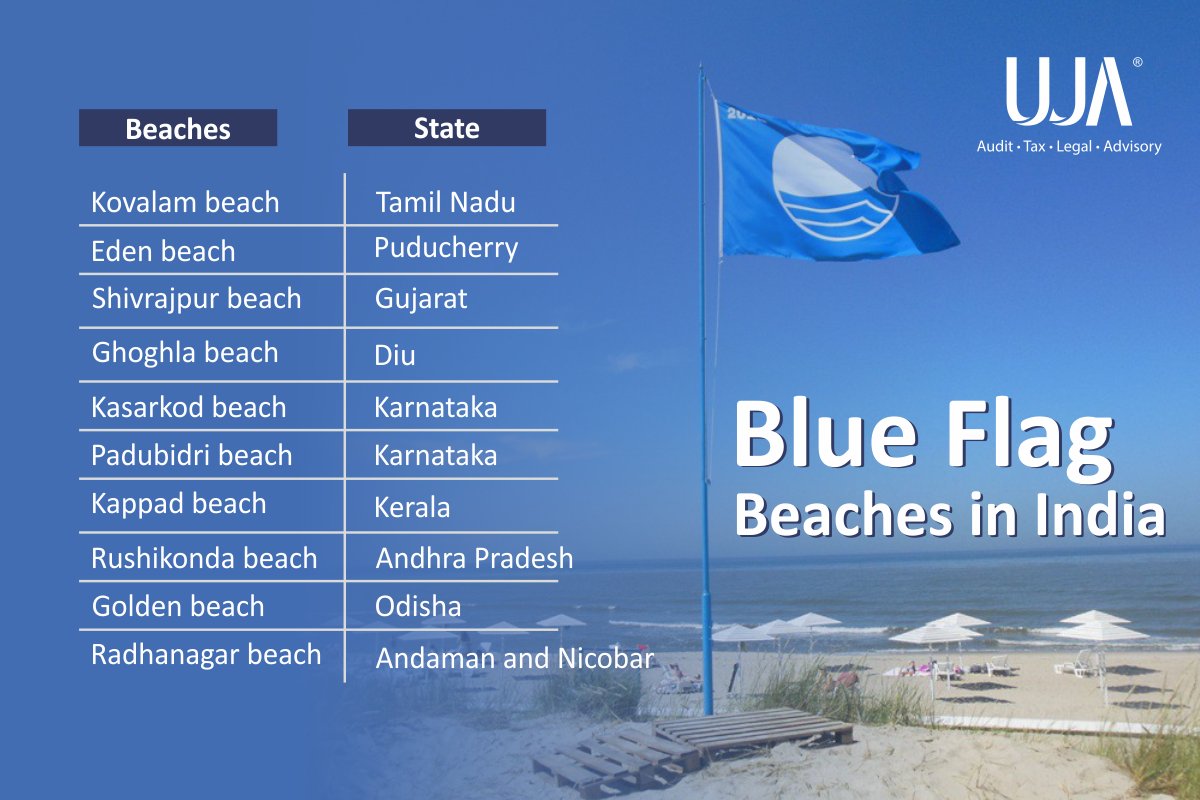India’s coastlines are home to stunning beaches. Some of these beaches have earned the prestigious Blue Flag certification.
This international award signifies clean, safe, and environmentally friendly beaches. Blue Flag beaches in India offer more than just scenic beauty. They promise a high standard of cleanliness, safety, and environmental care. With growing awareness about eco-friendly travel, these beaches are becoming popular choices for travelers.
The Blue Flag certification ensures these beaches meet strict criteria, making them ideal for family outings and nature lovers alike. Explore India’s top Blue Flag beaches and discover why they stand out. Whether you seek relaxation or adventure, these beaches offer an unforgettable experience. Dive into the beauty and charm of India’s certified coastal gems.
Introduction To Blue Flag Beaches
India, with its vast coastline, is home to several Blue Flag beaches. These beaches are known for their pristine beauty and high environmental standards. The Blue Flag certification is a mark of excellence. It signifies clean, safe, and well-managed beaches. But what does it take to earn this recognition? Let’s explore.
Criteria For Certification
The Blue Flag certification has strict criteria. Beaches must meet 33 criteria. These criteria fall into four categories: environmental education, water quality, environmental management, and safety. Each category is crucial for maintaining high standards.
Environmental education involves spreading awareness about beach cleanliness. Clean water is essential for the safety of visitors. Environmental management ensures that the beach remains litter-free. Safety measures include lifeguards and first aid stations. Meeting these criteria is no small feat. It requires continuous effort and dedication.
Global Significance
The Blue Flag certification is recognized worldwide. It is awarded by the Foundation for Environmental Education. This recognition places Indian beaches on the global map. It attracts tourists and promotes sustainable tourism. Tourists seek destinations that maintain high environmental standards. Certified beaches offer a promise of quality.
Blue Flag beaches also boost local economies. They create jobs and encourage eco-friendly practices. This certification is not just a badge of honor. It is a commitment to preserving natural beauty. It shows that India cares about its environment. This global significance cannot be overstated.

Credit: www.civilsdaily.com
Blue Flag Beaches In India
India’s coastline, stretching over 7,500 kilometers, is home to some of the most stunning beaches in the world. Recently, several of these beaches have been awarded the prestigious Blue Flag certification, a testament to their water quality, environmental management, and safety standards. Let’s explore the current Blue Flag beaches in India and the exciting upcoming additions.
Current List
Currently, India boasts a select number of Blue Flag beaches that have met the stringent criteria set by the Foundation for Environmental Education (FEE). Here are the beaches that have earned this coveted certification:
- Chandrabhaga Beach, Odisha: Known for its serene environment and cultural significance, Chandrabhaga Beach offers a perfect blend of natural beauty and historical richness.
- Golden Beach, Puri: This beach is famous for its golden sands and is a popular destination for both tourists and pilgrims.
- Rushikonda Beach, Andhra Pradesh: Nestled in the city of Visakhapatnam, this beach is a haven for water sports enthusiasts.
- Ghoghla Beach, Diu: With its clear waters and clean surroundings, Ghoghla Beach is a great spot for a peaceful retreat.
- Kappad Beach, Kerala: Known for its historical significance as the landing spot of Vasco da Gama, Kappad Beach is a picturesque location with a rich heritage.
- Kasarkod Beach, Karnataka: This beach is a perfect getaway with its pristine sands and lush greenery.
- Padubidri Beach, Karnataka: A beach that combines modern amenities with natural beauty, making it an ideal spot for relaxation.
- Radhanagar Beach, Andaman & Nicobar Islands: Often ranked among the best beaches in Asia, Radhanagar Beach offers stunning sunsets and crystal-clear waters.
Upcoming Additions
India is on a mission to increase the number of Blue Flag beaches along its coastline. Here are some beaches that are in the pipeline for Blue Flag certification:
- Elliot’s Beach, Tamil Nadu: Located in Chennai, Elliot’s Beach is known for its peaceful ambiance and is set to enhance its environmental standards to achieve the Blue Flag certification.
- Marina Beach, Tamil Nadu: As one of the longest urban beaches in India, Marina Beach is aiming to improve its facilities and cleanliness to join the Blue Flag list.
- Palolem Beach, Goa: Famous for its crescent shape and vibrant nightlife, Palolem Beach is gearing up to meet the Blue Flag criteria.
- Miramar Beach, Goa: This beach is popular among families and is working towards achieving the Blue Flag status with enhanced safety measures and environmental management.
Imagine planning your next beach vacation with the assurance that the place you’re visiting adheres to the highest standards of cleanliness, safety, and environmental care. Doesn’t that sound appealing? With more beaches aiming for Blue Flag certification, you can look forward to more such destinations in India.
Have you ever visited a Blue Flag beach? How did it compare to other beaches you’ve been to? Share your experiences in the comments below!
Environmental Impact
Blue Flag Beaches in India are not just about picturesque views and pristine sands. They are symbols of sustainable tourism and environmental stewardship. The environmental impact of these beaches is profound, as they prioritize ecological balance and the well-being of marine ecosystems. Let’s dive deeper into how these beaches contribute to environmental conservation.
Conservation Efforts
Blue Flag Beaches in India are at the forefront of conservation efforts. Authorities implement stringent measures to maintain water quality, manage waste effectively, and conserve the natural habitat. Regular beach clean-ups involve local communities and tourists alike. This not only keeps the beaches clean but fosters a sense of responsibility among visitors.
When I visited one of these beaches, I noticed well-placed recycling bins, informative signage about the local wildlife, and designated areas for beach activities. These small yet significant measures ensure minimal human impact on the environment. Have you ever considered how your beach activities might affect the ecosystem?
Marine Life Protection
Protecting marine life is a crucial aspect of the Blue Flag program. The beaches serve as safe havens for a variety of marine species. By regulating activities such as boating, fishing, and even swimming, the program minimizes disruptions to marine habitats.
During my visit, I attended a workshop on marine biodiversity. The local experts shared fascinating insights on how simple actions, like using eco-friendly sunscreen, can protect coral reefs. This experience made me more conscious of my choices. Are you aware of how your sunscreen might affect the ocean?
Moreover, Blue Flag Beaches conduct regular marine life monitoring. This helps in tracking the health of marine populations and taking timely action if needed. Such proactive measures ensure that the delicate balance of marine ecosystems is maintained.
In conclusion, Blue Flag Beaches in India are more than just beautiful destinations. They are active participants in environmental conservation and marine protection. The next time you plan a beach holiday, consider choosing a Blue Flag Beach. Your choice can contribute to a healthier planet.
Tourism Boost
Blue Flag beaches in India have significantly boosted tourism. These beaches meet high environmental and safety standards, attracting many visitors. The certification also promotes sustainable tourism practices.
Economic Benefits
Tourism generates revenue for local businesses. Hotels, restaurants, and shops see increased activity. The influx of tourists creates job opportunities. Locals find work in hospitality and service sectors.
Increased tourism also stimulates infrastructure development. Roads, facilities, and public services improve. Better infrastructure attracts even more tourists. This creates a positive economic cycle for the region.
Local Community Involvement
The Blue Flag certification involves local communities. Residents participate in beach maintenance programs. They help in keeping the beaches clean and safe. Community involvement fosters a sense of pride and ownership.
Locals also engage in environmental education. They learn about sustainable practices and eco-friendly tourism. This knowledge helps protect natural resources. It ensures the beaches remain pristine for future generations.
Popular Blue Flag Beaches
When it comes to pristine beaches and crystal-clear waters, Blue Flag beaches in India are a treasure trove of natural beauty and environmental excellence. These beaches have been awarded the prestigious Blue Flag certification for meeting stringent environmental, educational, safety, and accessibility criteria. Here, we explore some of the most popular Blue Flag beaches in India that you should definitely add to your travel bucket list.
Kappad Beach
Located in the state of Kerala, Kappad Beach is a historic marvel and a serene escape. This beach is where the famous Portuguese explorer Vasco da Gama first landed in India in 1498. The golden sands and swaying palm trees create a picturesque setting for a perfect day by the sea. The beach is not just about its beauty; it’s also equipped with clean facilities and a robust waste management system, making it an eco-friendly destination.
One unique aspect of Kappad Beach is its seamless blend of history and natural beauty. Imagine walking on the same sands where explorers once tread, all while enjoying the modern amenities that ensure a clean and safe environment. Have you ever wondered what it would be like to experience history and nature in one go? Kappad Beach gives you that rare opportunity.
Shivrajpur Beach
Shivrajpur Beach in Gujarat is another gem on India’s Blue Flag list. It boasts stunning white sands and clear waters, making it an ideal spot for both relaxation and adventure. The beach is well-maintained, offering excellent facilities such as clean restrooms, changing rooms, and even provisions for differently-abled visitors.
One of the highlights of Shivrajpur Beach is its vibrant marine life. Snorkeling here reveals a colorful underwater world that is simply mesmerizing. If you love marine adventures, you’ll find Shivrajpur Beach a perfect destination. Ever thought about snorkeling in India? This beach provides a safe and accessible way to explore the underwater beauty without traveling to far-off destinations.
Both Kappad and Shivrajpur beaches are excellent examples of how India is embracing sustainable tourism. They offer a perfect mix of natural beauty, historical significance, and modern amenities. Have you visited any Blue Flag beaches yet? If not, these should be at the top of your list.

Credit: www.moneycontrol.com
Activities And Attractions
Blue Flag Beaches in India offer diverse activities and attractions. These beaches are perfect for families, friends, and solo travelers. They provide a mix of fun, adventure, and relaxation. Discover thrilling water sports, serene nature trails, and much more.
Water Sports
Blue Flag Beaches are a haven for water sports enthusiasts. Try jet skiing for an adrenaline rush. Experience the thrill of windsurfing. Paddleboarding offers a calmer adventure. Kayaking is perfect for exploring the coastline. Snorkeling lets you see vibrant marine life. Scuba diving can take you deeper into underwater worlds. Each beach has its unique offerings.
Nature Trails
Explore the beauty of nature with scenic trails. Walk through lush greenery. Enjoy bird watching along the way. These trails provide a peaceful escape. They are perfect for morning walks. Some trails lead to stunning viewpoints. Capture breathtaking sunrise or sunset views. Nature trails are ideal for reconnecting with nature.
Challenges Faced
Blue Flag Beaches in India face challenges such as maintaining cleanliness and ensuring sustainable tourism practices. Protecting marine life and balancing visitor influx are also significant concerns.
Blue Flag Beaches in India are renowned for their clean, safe, and environmentally friendly environments. However, maintaining these prestigious standards comes with its own set of challenges. Let’s dive into the two key areas where these challenges are most prominent.Pollution Control
Pollution control is a significant challenge for Blue Flag Beaches in India. When I visited Shivrajpur Beach in Gujarat, I was amazed by its pristine beauty. But behind the scenes, a lot of effort goes into keeping it that way. Plastic waste is one of the biggest culprits. Despite awareness campaigns, people still leave behind plastic bottles and wrappers. To combat this, local authorities have implemented strict rules and fines. They also conduct regular beach clean-up drives, often involving volunteers. Have you ever participated in a beach clean-up? It’s eye-opening to see the amount of waste collected in just a few hours. Another issue is water pollution. Industrial waste and untreated sewage can contaminate the water, affecting marine life and human health. Advanced filtration systems and regular water quality checks are essential. But these measures are costly and require continuous monitoring.Sustainable Tourism
Sustainable tourism is another hurdle. When I first heard about the Blue Flag certification, I wondered how tourism could be both sustainable and profitable. The answer lies in balancing visitor numbers with environmental protection. Overcrowding can degrade the natural environment. Take, for example, the popular beaches in Goa. During peak season, the influx of tourists puts immense pressure on local resources. To manage this, authorities have introduced visitor caps and promoted off-season tourism. This not only reduces environmental stress but also provides a steady income for locals year-round. Local businesses also play a crucial role. Resorts and restaurants must adhere to eco-friendly practices, like using biodegradable materials and conserving water. Have you noticed how some places now offer paper straws instead of plastic ones? Small changes like these add up. Sustainable tourism also involves educating visitors. Information boards and guided tours can help tourists understand the importance of preserving these beautiful locations. Next time you visit a Blue Flag Beach, take a moment to read the informational signs. They offer valuable insights into the local ecosystem. So, what can you do to help? Simple actions like carrying your own water bottle, avoiding single-use plastics, and respecting local guidelines can make a big difference. Your efforts contribute to the ongoing success of Blue Flag Beaches in India.Future Prospects
India’s Blue Flag beaches are a testament to the country’s commitment to environmental sustainability and tourism excellence. These pristine beaches, certified by the Foundation for Environmental Education (FEE), promise a cleaner, safer, and more eco-friendly beach experience. But what does the future hold for these remarkable coastal gems? Let’s delve into the future prospects of Blue Flag beaches in India.
Expansion Plans
The expansion plans for Blue Flag beaches in India are ambitious and well-structured. The government aims to increase the number of certified beaches significantly over the next few years. Currently, there are 12 Blue Flag beaches in India, but the target is to double this number.
Imagine visiting not just a handful of exceptional beaches but a whole coastline of them. This expansion will not only boost tourism but also promote environmental awareness among locals and visitors. As someone who has visited these beaches, I can attest to their unique charm and cleanliness. You can look forward to more such experiences in different parts of the country soon.
Long-term Goals
The long-term goals for Blue Flag beaches in India are centered around sustainability and community involvement. The focus is not just on achieving the certification but maintaining the high standards set by the Blue Flag program. This means regular monitoring, continuous improvement, and active participation from local communities.
Community involvement is crucial. Local residents and businesses play a significant role in maintaining the cleanliness and safety of these beaches. When you visit a Blue Flag beach, you’re not just enjoying a day in the sun; you’re supporting a sustainable initiative that benefits the entire ecosystem.
Moreover, the long-term vision includes integrating advanced technologies for waste management and water quality monitoring. This will ensure that the beaches remain clean and safe for future generations. Have you ever wondered what our beaches would look like if everyone took responsibility for their upkeep?
By focusing on these long-term goals, India can set a global example in beach management and environmental conservation. As a beach lover, this is something you can look forward to and be a part of.
What are your thoughts on the future of Blue Flag beaches in India? How do you think these initiatives will impact your beach-going experiences? Share your insights and join the conversation!

Credit: x.com
Frequently Asked Questions
How Many Beaches Have A Blue Flag In India?
India has 12 Blue Flag beaches.
Which Is The 13th Blue Flag Beach In India?
The 13th Blue Flag beach in India is Minicoy Thundi Beach. It is located in Lakshadweep.
Does The Us Have Any Blue Flag Beaches?
No, the US does not have any Blue Flag beaches. The Blue Flag certification program has not been widely adopted in the United States.
What Is Meant By Blue Flag Beach?
A Blue Flag beach meets high environmental and safety standards. It is certified by the Foundation for Environmental Education.
Conclusion
Exploring Blue Flag beaches in India offers a unique experience. Clean, safe, and eco-friendly destinations await you. Enjoy pristine sands and clear waters. Each beach has its own charm and beauty. Perfect for family outings or peaceful retreats. Feel nature’s touch and relax.
Plan your next visit soon. Discover the best of India’s coastal gems. Make memories that last forever. Dive into adventure and tranquility. Blue Flag beaches are India’s coastal treasures. Ready for your next escape?
{ “@context”: “https://schema.org”, “@type”: “FAQPage”, “mainEntity”: [ { “@type”: “Question”, “name”: “How many beaches have a Blue Flag in India?”, “acceptedAnswer”: { “@type”: “Answer”, “text”: “India has 12 Blue Flag beaches.” } } , { “@type”: “Question”, “name”: “Which is the 13th Blue Flag beach in India?”, “acceptedAnswer”: { “@type”: “Answer”, “text”: “The 13th Blue Flag beach in India is Minicoy Thundi Beach. It is located in Lakshadweep.” } } , { “@type”: “Question”, “name”: “Does the US have any Blue Flag beaches?”, “acceptedAnswer”: { “@type”: “Answer”, “text”: “No, the US does not have any Blue Flag beaches. The Blue Flag certification program has not been widely adopted in the United States.” } } , { “@type”: “Question”, “name”: “What is meant by Blue Flag beach?”, “acceptedAnswer”: { “@type”: “Answer”, “text”: “A Blue Flag beach meets high environmental and safety standards. It is certified by the Foundation for Environmental Education.” } } ] }




